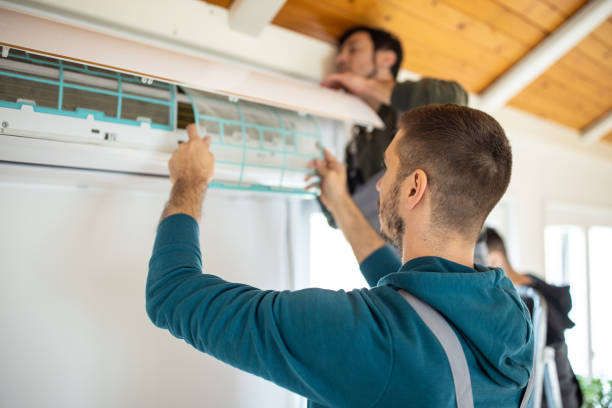Introduction to HVAC Repair vs Replacement
Deciding whether to repair or replace your HVAC system can be challenging for homeowners and property managers in Northern Virginia. At Arminco Air(AAI), we know that making the right choice saves money, ensures comfort, and extends the life of your system. Factors like repair costs, system age, and performance play a big role in this decision. This article provides clear, expert insights to help you determine whether to repair or replace your HVAC system, focusing on common issues, costs, and long-term benefits.
Common HVAC Problems and Troubleshooting
Understanding the issues your HVAC system faces is the first step in deciding whether to repair or replace it. Identifying problems early can prevent bigger headaches down the road.
HVAC Troubleshooting Basics
HVAC troubleshooting involves spotting signs of system failure, such as strange noises, uneven temperatures, or weak airflow. These issues often indicate problems like clogged filters, thermostat malfunctions, or minor component failures. Regular maintenance can catch these early, but persistent problems may signal the need for bigger decisions.
- Noises: Grinding or squealing could point to motor issues.
- Poor Airflow: Dirty filters or duct blockages are common culprits.
AC Compressor Failure
The AC compressor is the heart of your cooling system. If it fails, you might notice warm air, loud noises, or frequent cycling. Compressor issues can sometimes be repaired, but replacement is often more cost-effective for older systems. A professional can assess whether the failure is isolated or part of broader system decline.
- Symptoms: Warm air or reduced cooling efficiency.
- Impact: A failed compressor can halt cooling entirely.
Factors Influencing Repair or Replace Decision
Several key factors help determine whether repairing or replacing your HVAC system is the better choice. Weighing these carefully ensures you make an informed decision.
HVAC Lifespan
Most HVAC systems last 10 to 15 years with proper maintenance. If your system is approaching or exceeding this range, replacement may be more practical than repeated repairs. Older systems often lose efficiency, leading to higher energy bills and reduced comfort.
- Typical Lifespan: 10 to 15 years for most systems.
- Age Check: Systems over 15 years are prime candidates for replacement.
HVAC Repair Cost
Repair costs vary depending on the issue. Minor fixes, like replacing a capacitor, might cost $200 to $500, while major repairs, like fixing a compressor, can exceed $2,000. If repair costs approach 50% of a new system’s price, replacement is often the smarter choice.
- Minor Repairs: Filters or thermostats are inexpensive fixes.
- Major Repairs: Compressors or heat exchangers can be costly.
System Efficiency and Performance
Older systems often struggle to maintain consistent temperatures and use more energy. Modern HVAC systems offer higher efficiency, with SEER ratings of 14 or above, reducing utility bills. If your system can’t keep up or your energy costs are rising, replacement may provide better long-term value.
- Energy Bills: Rising costs indicate declining efficiency.
- Comfort Issues: Inconsistent temperatures suggest system struggles.
When to Choose HVAC Repair
HVAC Repairs are often the best choice for newer systems or minor issues. Fixing problems early can extend your system’s life and maintain its efficiency.
Scenarios Favoring Repair
Repairs make sense when your system is under 10 years old, the issue is isolated, and the repair cost is reasonable. For example, replacing a faulty thermostat or cleaning clogged ducts can restore performance without breaking the bank.
- Young Systems: Units under 10 years often benefit from repairs.
- Simple Fixes: Low-cost repairs can prevent further damage.
Benefits of Timely Repairs
Addressing issues promptly can save money and prevent system failure. Regular maintenance, like annual tune-ups, catches small problems before they escalate, keeping your system running smoothly and efficiently.
- Cost Savings: Early repairs avoid more expensive fixes later.
- Extended Life: Maintenance can add years to your system.
When to Opt for HVAC Replacement
Replacement is often the better choice for older systems or when repairs become too frequent or costly. A new system offers improved performance and savings.
Signs It’s Time to Replace
Consider replacement if your system is over 15 years old, requires frequent repairs, or struggles to maintain comfort. Other signs include rising energy bills, outdated technology, or the need for major repairs like a new compressor.
- Frequent Breakdowns: Multiple repairs in a year signal decline.
- Outdated Technology: Older systems lack modern efficiency features.
Advantages of Replacement
A new HVAC system offers significant benefits, including better energy efficiency, lower utility bills, and improved comfort. Modern systems also come with advanced features like smart thermostats and variable-speed motors, enhancing performance and convenience.
- Lower Bills: High-efficiency systems reduce energy costs.
- Better Comfort: Consistent temperatures improve indoor environments.
Expert Tips for Making the Decision
Making the right choice between repair and replacement requires careful evaluation and professional input. These tips can guide you to a smart decision.
Consulting a Professional
A qualified HVAC technician can assess your system’s condition and provide tailored advice. They’ll perform diagnostic tests, evaluate repair costs, and compare them to the benefits of replacement. A trusted professional ensures you avoid unnecessary expenses.
- Diagnostics: Professionals identify underlying issues accurately.
- Expert Advice: Technicians weigh repair vs replacement pros and cons.
Evaluating Long-Term Costs
Consider both upfront and long-term costs. Repairs may seem cheaper initially, but frequent fixes on an old system can add up. A new system, while more expensive upfront, often saves money over time through lower energy bills and fewer repairs.
- Upfront Costs: Repairs are cheaper short-term, but replacements save long-term.
- Energy Savings: New systems reduce monthly utility expenses.
Conclusion
Deciding whether to repair or replace your HVAC system is a big decision for Northern Virginia homeowners and property managers. By considering factors like system age, repair costs, and efficiency, you can make a choice that balances comfort and budget. Repairs are ideal for newer systems with minor issues, while replacement suits older, inefficient units. Consulting a professional ensures you get expert guidance tailored to your needs. For help making the right decision, contact us to schedule a consultation.
FAQ’s
What are the signs of AC compressor failure?
Signs include warm air from vents, loud noises like grinding or clicking, and frequent system cycling. A professional can confirm if the compressor needs repair or replacement.
How long does an HVAC system typically last?
Most HVAC systems last 10 to 15 years with regular maintenance. Systems over 15 years old are often less efficient and may need replacement.
How much does HVAC repair cost compared to replacement?
Minor repairs cost $200 to $500, while major repairs can exceed $2,000. Replacement costs range from $3,000 to $7,000 for residential systems, making it more economical for older units.
Can repairs improve the efficiency of an older HVAC system?
Repairs like cleaning coils or replacing filters can improve efficiency slightly, but older systems (over 10 years) often benefit more from replacement due to outdated technology.
How do I know if my HVAC system is outdated?
If your system is over 15 years old, uses high amounts of energy, or lacks modern features like smart thermostats, it’s likely outdated and worth considering for replacement.



